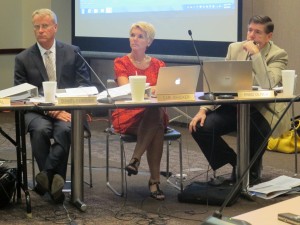For State Board To Work, Eliminating CECI Is Only The First Step
“Our reputations precede us.” Arguably, for no other figure or group in Indiana’s education scene does this ring more true than for the State Board of Education.
Take a look at some of these tweets that exemplify how some people view the Board of Education:
Just sat down to work on some grades and watch Family Feud #INSBOE
— John Wells (@rhsteach) December 3, 2014
I’m watching #INSBOE tweets from a food court a few blocks away. Seems like a safe distance.
— Tammy Lieber (@tammylieber) December 3, 2014
Following #INSBOE tweets. Feel like I should grab popcorn
— lmjancek (@lmjancek) December 3, 2014
Like it or not, the board has become known for its squabbles. Arguments tend not to stem from policy disagreements, but rather issues of authority, board procedure and miscommunication.
State superintendent Glenda Ritz frequently points to the Center for Education and Career Innovation as the source of tension. Governor Mike Pence, a Republican, created the education agency in August 2013. Ritz, a Democrat, says CECI is a shadow agency to her own Department of Education, duplicating services and clouding questions of authority.
That’s why Governor Pence announced last week he would dissolve CECI. He says he saw it as a first step to restoring harmony on the board.
“I’m proud of the work the CECI has done in the last two years, but I am aware of the controversy that has surrounded this center since its creation,” Pence admitted. “Frankly there are too many entities with overlapping responsibilities in education at the highest levels in Indiana. For education to work in our state, it has to work at the highest levels.”
But will this move actually solve anything?
A History Of Strain
Pence’s announcement came during a legislative conference last week, where the governor said he wants state lawmakers to focus heavily on education reform in the upcoming legislative session. He outlined a number of initiatives – providing more money for school vouchers, expanding access to charter schools, increasing performance funding – but added that change has to start at the top.
“To maintain our momentum and implement new policies, we’ll also need to fix what’s broken in education in Indiana,” Pence said. “For education to work in our state, it has to work at the highest levels, and somebody’s got to take the first step to restore harmony and trust among those that are charged with overseeing education in our state.”
CECI has been a frequent scapegoat in ongoing battles between Democratic state superintendent Glenda Ritz and members of the state board, who the governor appoints.
Ritz’s colleague John Barnes, the director of legislative affairs at the Department of Education, reiterates the superintendent’s view of CECI as the main source of board tensions.
“Sometimes it’s a little bit like Abbott and Costello doing ‘who’s on first’,” Barnes joked. “It was created by executive order, it was created outside of legislation, and our feeling is that that has created chaos in the educational policy area. We now have duplications of services and confusion on roles and responsibilities. We feel like CECI is truly the cause of these problems.”
“My department is used to the governor’s education agency interfering with our daily work,” Ritz told board members during their one of its many infamous struggles this past July regarding the state’s application for a federal No Child Left Behind waiver.
After that same meeting, board member Gordon Hendry told the media that the system in Indiana was set up to allow multiple voices to chime in on education policy.
“The governor, the legislature, and the State Board of Education have a very critical role to play in education policy in the state of Indiana,” Hendry said. “The Superintendent is really responsible for managing the Indiana Department of Education, and that’s her role in the system. There’s no such thing as an ‘education czar’ in the state.”
Claire Fiddian-Green, Pence’s special assistant for education innovation who headed up CECI, said it didn’t make sense for the Department of Education to continue to act as fiscal agent for the State Board because their responsibilities come from a different place in Indiana code.
“I think there was a misunderstanding that somehow the creation of this center was taking something away,” Fiddian-Green told StateImpact last year.
[pullquote] Indiana is unique, and that has created some challenges for us. – Brad Oliver, State Board of Education member[/pullquote]
Board member Brad Oliver echoed those sentiments last week, just hours before the governor made his announcement.
“There has to be an understanding amongst everybody in Indiana that our model in our state is based on a shared governance structure,” Oliver explained. “The General Assembly plays a role in that, certainly the governor’s office does through the appointed members to the state board, and then so does the Department of Education. When any one of those entities basically asserts itself as the sole authority over education, we have a problem.”
Indiana is one of only 12 states where the state superintendent is elected. It’s more common for state boards across the country to appoint or recommend their top education officials, according to the National Association of State Boards of Education.
“Indiana is unique, and that has created some challenges for us in terms of how we approach that work and how agendas are set and how meetings unfold,” Oliver says.
Why Can’t We Get Along?
Time to address the elephant in the room: political persuasion.

Rachel Morello / StateImpact Indiana
State Board of Education members Dan Elsener (left), Cari Whicker and Brad Oliver were each appointed to his or her position by a Republican governor, which some say accounts for the tension with Democratic superintendent Glenda Ritz.
Pence is a Republican. Ritz is a Democrat. The ten other current members of the state board were appointed by either Pence or former governor Mitch Daniels, also a Republican.
“It’s refreshing to know that if we remove CECI from the mix, everything will be great and everyone will get along great and our educational system is going to be flowing along after that. The reality is that’s not true,” says Sen. Carlin Yoder, R-Middlebury. “This is what happens when you get somebody elected within the DOE who has one philosophy, and a governor who has a different philosophy. You’re going to have people butting heads. I don’t see that changing anytime soon.”
Since Indiana’s state board was established in 1852, there have been 64 years during which the superintendent of public instruction and the governor came from different political parties.
Sen. Yoder says he had some concerns about CECI when it was first created in August 2013 – he admits he wasn’t completely sure what the agency was intended to do, and he says he was happy to see the governor eliminate the group because it could mean lawmakers can refocus their energy where it really matters.
“Hopefully it forces the DOE and the state board to figure out ways to work together now,” Yoder says. “In the end, whatever the legislature [does] needs to be in the best interest of kids, not for political interest or for vindictiveness or anything else.”
Lewis Ferebee, superintendent of Indianapolis Public Schools and frequent attendee of monthly state board meetings, says no matter who is in charge or what party they represent, the subject of education is bound to stir the pot.
“The complexities of educating our youth and ensuring that our students and families get what they need will always generate spirited conversations,” Ferebee says. “There’s a lot at stake. There are a lot of decisions that are made that will not only impact today [but also] our future, and I think as you have those conversations, there will always be a debate.”
Keep in mind, nothing like CECI ever existed before. Until last year, the modern state board and DOE, as they exist today, operated without a third party’s involvement since 1984.
But Wait, That’s Not All…
Superintendent Ritz praised the Governor’s decision to eliminate CECI, but then she added this to her statement:
“While dissolving CECI is certainly welcome news, there are other aspects of the Governor’s legislative agenda that are concerning for public education in our state.”
– State Superintendent Glenda Ritz
Ritz didn’t specify what she was referring to, but we have a guess.
In connection with taking CECI off the case, Pence also said he wants the general assembly to enact reform that would allow the state board to elect its own chair. Right now the state superintendent automatically holds that position. If the legislature did what Pence wants, it could strip Glenda Ritz of some of her authority.
“It’s time to take politics out of education in Indiana, or at least out of the State Board of Education and allow that body to get back to the business of focusing on implementing the policies that the people of Indiana have embraced and enacted, and seeing them faithfully through to their completion,” Pence said.
Rep. Brian Bosma, R-Indianapolis, speaker of the Indiana House of Representatives, praised the governor’s call to make education a priority, but didn’t mention anything about changing the superintendent’s role.
[pullquote] It’s time to take politics out of education in Indiana, or at least out of the State Board of Education. – Gov. Mike Pence[/pullquote]
Sen. Yoder says he believes the legislature will give it some time for discussion in the upcoming 2015 session.
“I think that absolutely has to happen, to be honest, because what’s happening right now is not working,” Yoder says.
However, if the legislature does what Pence wants, it could strip Ritz of some of her authority – and ultimately make party lines an issue all over again.
Pence officially dissolved CECI by executive order last week, but the move won’t take effect until February 20.

